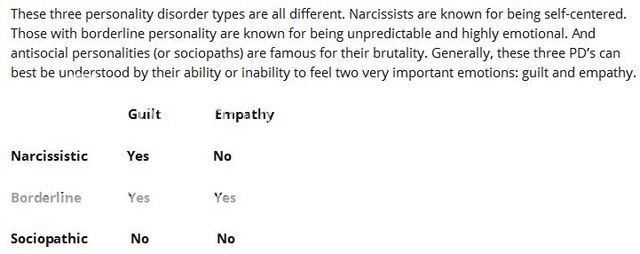It has been important to me to differentiate between narcissism and sociopathy because it will determine whether it is worth my while to continue an ongoing relationship with my Dad whether he feigns neediness or not.
So this morning before I replied to this morningís posts I was vacillating and back to being angry again. I guess that should come as no surprise.
I found a valuable article at PsychCentral that outlines some of the differences between three personality disorder types and their capacity for guilt and empathy. Here is a screenshot:

Then I went to Wikipedia and read the black and white descriptions and DSM-5 / ICD-10 criteria for both narcissistic and antisocial personality disorders and he fit both. The one thing that stood out to me in the PsychCentral article about sociopaths is that they view Ė and treat Ė the people in their lives as chess pieces. This is clearly evident with the situation that both myself and my stepmom are in (and itís probably no coincidence that the game of chess has been one of his lifelong pastimes).
Itís worth mentioning that my Dad belongs to a motorcycle ďclubĒ (and not the charitable kind). Iím not sure I would characterize them as a gang, but if not then they definitely mask themselves as ruffians and just bust beer bottles over other peopleís heads once in a while. I think the older members just kind of hang out and and pass on their BS pseudo-thuggery wisdom to the younger ones (although as none of them are doing life, they must have mastered something). As he stays out of jail, I think the whole getup is just a toughguy veneer for my Dad. Heís a coward and Iíve never known him to take on anything bigger than himself. Itís also worth noting that he managed to retire from General Motors with a pretty impeccable track record. And see Ė thatís one of the things that makes me wonder if heís merely narcissistic, but there ARE higher functioning sociopaths and I think itís more of a sliding scale.
In one recent email Ė after having been warned several times not to discuss family under the threat of abandonment Ė I mentioned some other family difficulties and even though I hadnít disclosed specific details or even named anyone specifically, he bluntly suggested cutting them all off forever. I wondered if he was trying to get a reaction or if he was serious, but I think he was serious because that is precisely what
he has done.
He and my brother had a falling out a few years ago and have had no contact since that time. When my Dad and I spoke about it face-to-face during our visit last year, my Dadís affect was very flat and he expressed no regrets, guilt, empathy, or desire to reconnect whatsoever. My poor brother struggles with issues much deeper and much more severe than mine and it saddens me very deeply that he might be a goner. At least he is aware of his issues, so perhaps there is hope. He is just a complete mess though. His issues stem from an inability to escape from his memories; in other words, imprisonment, where mine stem from detachment through forgiveness. There is a fine line between detachment / forgiveness and denial though. I wonder if what I thought was forgiveness was really denial, because I always readily accepted blame up until very recently (according to my parents, their poor behavior and neglect was because I was just a ďbad kidĒ). When my Dad contacted me and informed me that my stepmom had cancer, I had JUST reached a place in my mind of true acceptance of his absence and freedom from responsibility for his actions. It took 30 years to get there. Fortunately, I donít hold myself accountable for his current actions, not intellectually or emotionally. Iím struggling with my conscience as far as making myself available to support him through this crisis. Maybe Joie was right when she said that I have done my duty. I hope he never contacts me again.
Now then, where was I last night? I guess I was talking about some book I borrowed from the library. Itís rather enabling and often promotes dramatic passivity, such as in this passage:
ďFor example, letís suppose that your parent has made a demeaning comment about your appearance, and you feel yourself becoming angry. Instead of staying with the anger and firing back at the parent or letting the anger move you to shame for disappointing the parent, it is at this point where you can mentally say that you donít want to act out of anger. You are going to choose to push the anger away for the moment, just act out of annoyance (a milder form of anger), and not let your parent know that the comment really angered you. So, you decide to make a noncommittal response, such as ďReally? Iíll need to pay better attention next time.Ē You can also ignore the comment, change the topic, or make a pleasant comment about the parentís appearance.Ē
Nah.